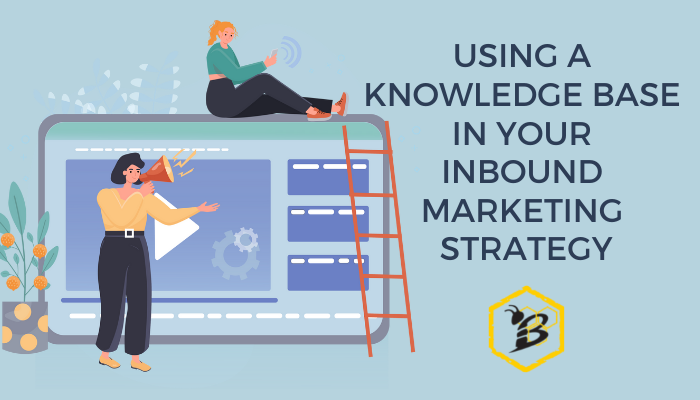A knowledge base is critically important for your customers who are craving a self-service support option. It, coupled with a chatbot, will allow your customer service team to be more efficient as well by only helping those with tier 2 support issues. But can a knowledge base help in your inbound marketing strategy as well? We think so. Let us explain...
It is widely documented that customers want self-service support options (Nuance Enterprise says 67%). Customers want to be able to search for their issue or obstacle via their phone or computer, find a solution, and then fix their problem all on their own and in less time than it takes to contact a live support agent. Sometimes this support style happens after support hours. Often, existing customers know where to go to find help on your website or in your app, or you may have a helpful chatbot that helps them find the information they need. But...
- What if ANYONE could access this great information that you've put together for your customers.
- What if someone typing in their issue in a google search box could see your knowledge base article on a search engine results page (SERP)?
If either of these could occur you'd easily be recycling this awesome internal resource that you spent weeks if not months creating to also be used as an inbound marketing attraction magnet!
Optimizing Your Knowledge Base
Well, there are a few components that you need to consider are in place prior to turning on this optimization tool in your marketing strategy.
- Team collaboration
- Personas
- Keywords
We'll cover each of them in detail below.
Team Collaboration
Some organizations work in bubbles or silos which means that marketing does what it needs regardless of the needs of the sales or customer service teams and likewise. However, if you aim to have your company knowledge base work double duty to attract prospects as well as support existing customers, you'll need to have (or create) a collaborative team environment. The customer service team maybe already has someone writing these knowledge base articles. And that individual is creating them based on the years of experience they have of what your customer needs to know in order to fix their issue. They are the subject matter expert (SME) of answering customer inquiries and troubleshooting issues that arise in order to find a solution for the customer.
However that SME is not on the marketing team and probably does not understand inbound marketing aspects. If you went to this SME and share the idea of tweaking some terms in the knowledge base article and changing the URL how would they react? Are the teams in your organization set up to collaborate?
If not, you need to focus on building those relationships and a collaborative environment first.
Personas
We often talk about personas because so much of marketing success relies on knowing and speaking to your personas. I would like to believe that if your company is writing knowledge base articles you are writing them in a tone comfortable with your current customers. That current customer should be a persona in your marketing efforts. Now based on the potential scenario of silos in your organization, this may not be true. You'll need to review any existing articles and ensure that the tone of the content is aligned with your personas. For example, if your persona is not technically adept, you'll need to ensure the knowledge base article is extremely detailed and includes step-by-step instructions with screenshots or other imagery to support the customer being able to create a resolution themselves.
Review your knowledge base articles. If they are not written for your personas, you will need to address those prior to optimizing them for search.
Keywords
As an inbound marketer you know keywords drive a lot of your organic traffic. When you understand what terms people are searching for, and how many people are searching, helps to form a solid content strategy. That is why it is crucial to include them in all of your strategy pieces. And if you were in charge of building the knowledge base articles I'm sure you would have instinctually added those same keywords in the knowledge base articles because they are infused in all of your efforts.
You may want to consider additional keyword terms for this new aspect of your organic search engine optimization (SEO). If you need a refresher on keyword research I always recommend this whiteboard Friday video on Keyword Research from Moz. Remember, keyword research is more about the process than the tool you use or have access to. Get in the mindset of your persona and determine what they would search for not what your product/service name is.
If you did not create the articles in your knowledge base, you'll need to review and edit those articles to ensure proper keywords are included. Make sure you are using best practices on the knowledge base articles in the same way you would on any web or landing page and use those identified keywords in:
- the URL
- the page title
- the page's H1
- the page meta description
- additional header tags
- image alt text
Using these keyword best practices in your knowledge base articles will ensure they are doubly purposeful in your organization for both the customer service and marketing teams.
Do you need keyword research or SEO support? Looking to add a knowledge base to your customer experience offerings? We'd love to chat and see how we can help you reach all of your inbound marketing strategy goals.



.png?width=100&height=100&name=HubSpot%20for%20K%E2%80%9312%20Education%20How%20Schools%20Use%20HubSpot%20to%20Improve%20Enrollment%20(and%20How%20to%20Set%20It%20Up).png)
.png?width=100&height=100&name=The%20Complete%20Guide%20to%20HubSpots%20Prospecting%20Agent%20(2025%20Edition).png)
